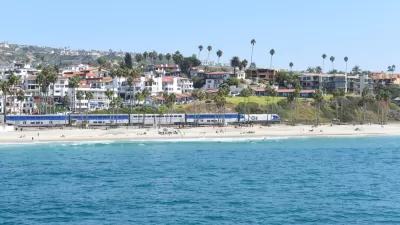In addition to replacing parking minimums with parking maximums of one space per unit in transit corridors, the city council went a step further by requiring unbundling, that is, requiring separate payment for parking from the housing.

"San Diego took a step toward becoming a less car-reliant city on Monday [March 4] when the City Council voted 8-1 to eliminate parking requirements for new condominium and apartment complexes in neighborhoods near mass transit [called Transit Priority Areas or TPAs]," wrote David Garrick, city hall reporter for The San Diego Union-Tribune. The policy reforms originated in Mayor Kevin L. Faulconer's office.
The policy change eliminates rules requiring developers to create at least one parking spot per unit for most projects, including steeper parking requirements for larger apartments and condominiums.
In addition, the policy sets a maximum of one parking space per unit for new apartment and condominium projects downtown.
It also requires developers to “unbundle” the cost of a parking spot from monthly rent or a condominium purchase price, allowing residents who prefer not to have a car to pay less for housing.
There is one ironic exception to the unbundling requirement included among the parking reforms in the Housing SD plan: no unbundling is required for projects in TPAs that include at least 20 percent affordable units. Lower income residents are more likely to use transit than wealthier tenants and be more willing to forgo owning a motor vehicle to lower housing costs.
While parking will no longer be required for new multifamily residences located within TPAs, there are mobility requirements in the parking reform policies:
Based on a project’s ranking for vehicle trip reduction, transportation amenities would be required. Amenities could include bicycle storage or repair stations; onsite bike share; transit pass subsidies; or onsite healthy food, retail or day care facilities.
It's not just about housing
While the major purpose of the parking reform measures is to increase housing development and affordability in transit-accessible locations, Garrick notes that "the plan also aims to help the city meet the goals of its legally binding climate action plan, which requires more people to commute by bicycling, walking and transit in order to reduce greenhouse gases."
Critics say...
As the vote count indicates, one council member opposed the parking reform measures. "The removal of parking requirements should be one of the last steps in moving our city away from car-centric transit, instead of one of the first," stated Councilwoman Jennifer Campbell. Garrick adds that critics predict that the reforms "will worsen parking scarcity in many neighborhoods, reducing quality of life and frustrating many residents."
Campbell and other critics said they’re concerned the policy change is a financial giveaway to developers, who are not obligated to pass the savings from not being required to build parking onto renters and home buyers.
Garrick notes that the parking reforms are "based on similar changes in Portland and Seattle, where softer parking requirements have resulted in decreased automobile ownership, increased transit use and greater housing production and affordability."
Before the parking reforms are codified, the ordinance must be approved for a second time, which Garrick noted will be within "coming weeks."
Why Mayor Faulconer?
There is only one Republican mayor among the ten U.S. cities with populations exceeding one million residents, and that would be Mayor Kevin L. Faulconer. Readers may wish to listen to a 20-minute interview of the mayor by Liam Dillon, who covers California state politics and policy for the Los Angeles Times: California housing crisis podcast: San Diego’s ‘Yes in My Backyard’ turn (March 14).
[The actual interview begins at 21:50 in the 42-minute podcast.]
Related in Planetizen:
- Major Parking Reform Effort Moving Forward in San Diego, February 4, 2019
- A Transit-Oriented Parking Reform Proposal in San Diego, December 17, 2018
- San Francisco Could Be Next to Eliminate Parking Minimums Citywide, November 28, 2018
- Downtown Cincinnati: Parking Not Required, September 21, 2018
- No More Parking Minimums in Hartford, Conn. (with link to Buffalo's parking minimum elimination), December 22, 2017
Hat tip to Brett Simpson of California Planning & Development Report.
FULL STORY: San Diego council votes 8-1 to wipe out parking requirements in neighborhoods near transit

Florida Considers Legalizing ADUs
Current state law allows — but doesn’t require — cities to permit accessory dwelling units in single-family residential neighborhoods.

Manufactured Crisis: Losing the Nation’s Largest Source of Unsubsidized Affordable Housing
Manufactured housing communities have long been an affordable housing option for millions of people living in the U.S., but that affordability is disappearing rapidly. How did we get here?

Research Shows More Roads = More Driving
A national study shows, once again, that increasing road supply induces additional vehicle travel, particularly over the long run.

EV Chargers Now Outnumber Gas Pumps by Nearly 50% in California
Fast chargers still lag behind amidst rapid growth.

Affordable Housing Renovations Halt Mid-Air Amidst DOGE Clawbacks
HUD may rescind over a billion dollars earmarked for green building upgrades.

Has Anyone at USDOT Read Donald Shoup?
USDOT employees, who are required to go back to the office, will receive free parking at the agency’s D.C. offices — flying in the face of a growing research body that calls for pricing parking at its real value.
Urban Design for Planners 1: Software Tools
This six-course series explores essential urban design concepts using open source software and equips planners with the tools they need to participate fully in the urban design process.
Planning for Universal Design
Learn the tools for implementing Universal Design in planning regulations.
City of Moreno Valley
Institute for Housing and Urban Development Studies (IHS)
City of Grandview
Harvard GSD Executive Education
NYU Wagner Graduate School of Public Service
City of Cambridge, Maryland
Newport County Development Council: Connect Greater Newport





























